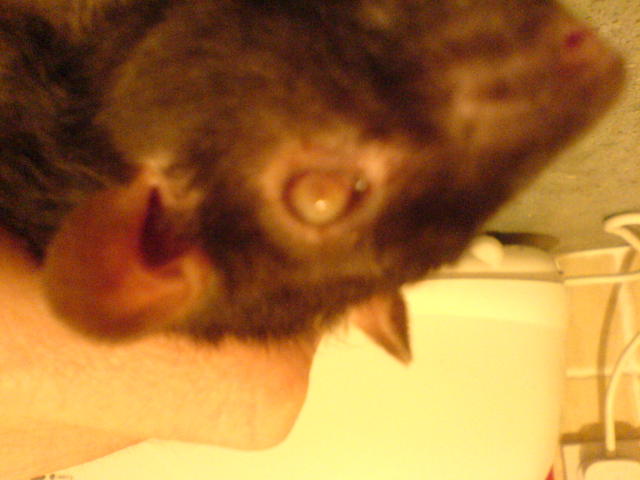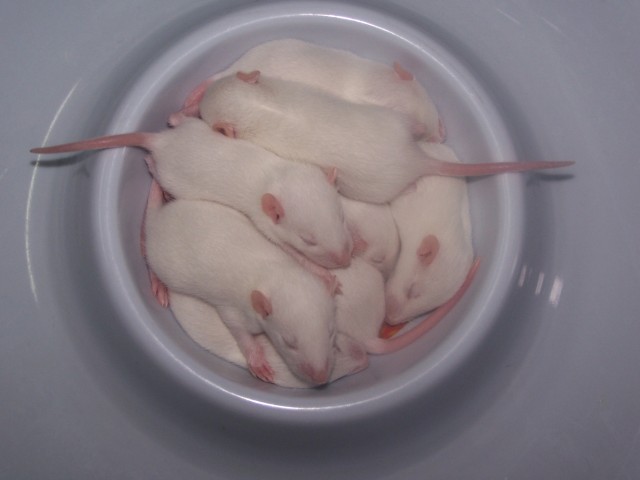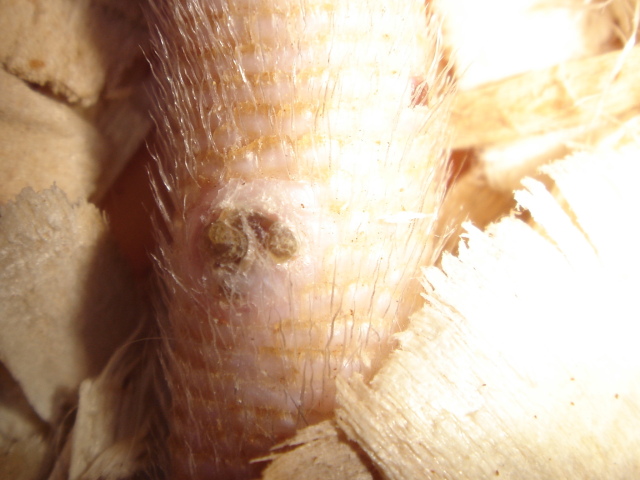QuestionHi... We purchased a "young" female rat for my 12 year old son for Christmas. After 2 days of her scratching her ears, blood appeared. We took her to the vet and were given a prescription bottle of Tresaderm, which is neomycin sulfate (3.2 mg per ml), thibendazole 40 mg per ml, dexamethasone 1 mg per ml. We put in 1 drop in each ear every day. The ears looked pink and healthy, the scratching stopped. "Linda" looked happy and chattered. This morning,five days after starting the medication, she was trembling and lying in her wheel. She died within an hour. We are puzzled. She is on soft paper bedding, eats rat block, has been give a small piece of carrot or broccoli every day, has fresh, purified water, and sleeps in an "edible" house. We would like to purchase another, as My son loved his rat, but we had her less than two weeks and don't want to have another one die. Please help if you can.
AnswerIt could have been just about anything, but I do not think it was related in any way to what your rat had going on with her. The medications used are relatively safe for rats, the doses are correct, and unless your little girl had liver or kidney disease, the thibendazole would not have caused any problems such as some type of fatal allergic reaction.
When you buy a rat from the pet store, you have no idea what you are getting. I get letters daily from distraught rat owners who are mourning the loss of their little rat friend they fell in love with only to have it die on them suddenly in just a short time. They are looking for closure and all I can really offer them is my educated opinion, but nothing concrete unless a necropsy was performed. The chances are high that she could have been born with heart disease or lung problems and she could have died from heart failure or even a blood clot. These things usually cause sudden and unexpected death. When you do not know anything about the line they are bred from, you could be getting just about anything. Years ago, when a couple would adopt a human baby, they had no idea really about their ancestors and had a very vague health history on the child. Same applies for rats from pet stores. In fact many of them are right out of the feeder bin, which means these rats were bred by breeder mills that bred dozens of rats,did not keep them in the most healthiest condition such as proper hygiene and nutrition, and when they get to the pet store to be sold as food for snakes, they more interesting looking rats with perhaps a fancier pattern to their fur or maybe they have dumbo ears etc...so they are picked out of the feeder bin and sold as PETS to the public. These poor babies are not always that healthy and come from a line of rats that can carry anything from cancer (which, despite the fact that female rats develop mammary tumors if they are not spayed at a young age, these tumors are rarely cancerous) to heart disease among other things.
Your best bet is to find a breeder somewhere, even if you have to drive a bit. Let me know your location and I can find a breeder or at least try to find one for you.
Also, where did you buy the rat from?
If you plan on getting another rat, please read up on my website, Sandyscrittercity.com on rat care. For starters, rats should be purchased in same sex pairs. Believe it or not, it does not cost more to have two rats. In fact, rats in pairs are happier which means they are healthier in the long run. Rats alone are often very lonely as rats are very very social animals and must be kept with a cagemate.
Also, I love both males and females, but do consider this: female rats are very prone to developing mammary tumors after they go through "rattie menopause" around 14 to 24 months of age with the more average age around 18 months. These tumors creep up and grow large fast. They can be removed, yes, but they often grow back. To avoid the growth of these tumors, it is best to spay them at a young age, between 3 and 5 months of age. This will lessen the chance because their hormones do not rise high after their menses cease (they will not have an estrus cycle to deal with of course!) and the high hormone levels are what stimulates the mammary tissue to multiply resulting in tumors. Yes, males have mammary tissue and they CAN get them, but its not as common, and once one is removed they almost never grow any back.
Males also are more laid back as they get older, more content to lay on your chest and watch television with you! Females are always on the go, exploring everything and they are more prone to escape the cage than males. They are just nosey all the way around! LOL
Males do NOT need neutered, either. They do not gain any health benefits from neutering. If the male is very aggressive, which is seen more when they go through puberty around 8 months of age, is when you would consider neutering a male rat, and if they are bred good, there is never any issue with aggression.
Also check out about proper diet (protein should be kept at 14% and under to avoid kidney disease in the future, and of course no pine or cedar should ever be used. You can read all of this on my website.
Please let me know if I can be of any more help to you. I am so sorry that you lost the little rat and only hope that next time you get rats they are much more healthier and live to be 4 years old!!

 Luna
QuestionLuna
Chiara and Luna
QUESTION: Hi
Luna
QuestionLuna
Chiara and Luna
QUESTION: Hi
 Eye infection (i think)
QuestionQUESTION: Hi, ive had my male rat for about 4 m
Eye infection (i think)
QuestionQUESTION: Hi, ive had my male rat for about 4 m
 thermal reaction of albino rats
Question
naughty kidz
hello!!
i have 12 albino rats...
thermal reaction of albino rats
Question
naughty kidz
hello!!
i have 12 albino rats...
 Rat fur in poor condition after hormonal implant
QuestionChiara and Luna
QUESTION: Hi Natasha I h
Rat fur in poor condition after hormonal implant
QuestionChiara and Luna
QUESTION: Hi Natasha I h
 my rats tails
QuestionQUESTION: hi :)
so, i have two pet rats; both a
my rats tails
QuestionQUESTION: hi :)
so, i have two pet rats; both a